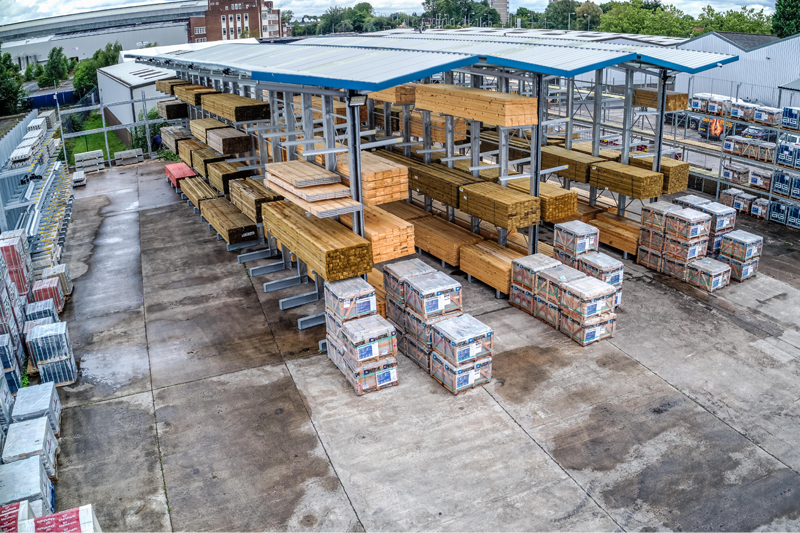
As the Brexit impasse drags on, the notion of stockpiling goods continues to permeate the thoughts of many supply chain businesses.
Clare Kitchener, Client Account Executive at BHIB Insurance Brokers, considers the potential issues confronting the merchant sector.
Britain’s economy strengthened in the first three months of the year, however many analysts were citing the growth of 0.5% on unprecedented stockpiling by manufacturers fearful of the impact from a no-deal Brexit.
As the uncertainty about what will happen when the UK leaves the EU continues, many builders’ merchants are amongst those stocking extra resources. However, any stockpiling in preparation for potential Brexit-related disruptions could potentially leave a business at risk of being underinsured.
It is therefore imperative that builders’ merchants make their broker or insurer aware of the extra stock. This is because their commercial insurance policy will only cover them for a specific amount and value. If a claim exceeds that amount then there’s a huge risk of underinsurance, and a significant financial shortfall on the claim.
So in the event of a claim for fire and theft and there being a considerable amount of stock value compared to the insured level, the claims payment would be reduced proportionately. Accordingly, it is vitally important that those merchants who are stockpiling ensure that the correct levels of insurance are in place now, rather than waiting for renewal.
Other issues to consider are increased expenses to import goods from the EU that might impact the cost of a claim. For example, if merchants are purchasing direct from abroad, there may well be increased transit costs but this can be covered off by effecting appropriate insurance.
Firstly the freight cost would normally be included in a transit claim when goods are imported, CIF (costs, insurance and freight) but the basis of the contract should always be pre-agreed. Secondly if purchasing from a UK or UK-based supplier who has imported goods, the increased cost should be picked up by invoice value.
Contracting firms whose stock has been purchased for a specific build contract, should be covered either on site or in temporary storage elsewhere in the UK, provided that they have an appropriate Contract Works policy and as long as the contract value is sufficient.
However, if your business is stockpiling to amass an unallocatedstock, then cover would not be provided by a Contract Works policy, and you would need to arrange separate cover for goods purchased — and also consider the issues of additional storage space at your own or other off-site locations. This could also have implications for security, increased fire risks and storage concerns.
There is the added concern of greater health and safety risks with warehouses for instance becoming more congested as a result of stockpiling. Similarly, there is the prospect of longer lead times in obtaining replacement stock, which may impact on contractual terms and penalties.
Broker top tips
- More stock could increase the risk of theft, so additional security provisions may be required. Insurers may insist that an existing audible alarm system is upgraded to a monitored system with a recognised central station alarm receiving (ARC) signalling, such as Redcare. CCTV may also need to be installed.
- Do not store expensive stock outside. Consider spreading the stock between locations, being mindful of keeping valuable stock at the most secure site.
- If there is an existing “Stillage condition” on the policy stipulating that stock needs to be stored off the floor and kept either on shelves or pallets, this needs to be adhered to and not breached.
- Ensure that staff are trained adequately and are fully aware of the stock storage procedures.
- Keep flammables stored safely whilst being mindful of the COSHH and DSEAR regulations. No more than 50 litres of flammables should be kept on the premises and any excess will need to be stored in an outside brick built store, preferably bunded so that any spillages are confined within the area to avoid pollution.
View from the builders’ merchant – Jehona Roys, Commercial Manager for Group Business Units at Kellaway Building Supplies:
“There is a lot of talk about the levels of stock that a company should hold at any point in time. However, we must not forget the ongoing Brexit debate and the dilemma of whether the stock levels should be increased — which has a great influence on the buying decisions. Regardless of this later point however, we make sure we follow our agreed framework and inform BHIB about any changes that we as a company undertake.
Our company strategy is to mitigate risk whenever possible and this means communicating on a regular basis with our insurers, both letting them know what our business needs are and them giving us practical advice in terms of eliminating the possible risk that may exist.”
For more information visit www.bhibinsurance.co.uk.









